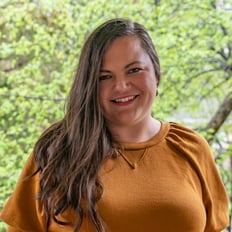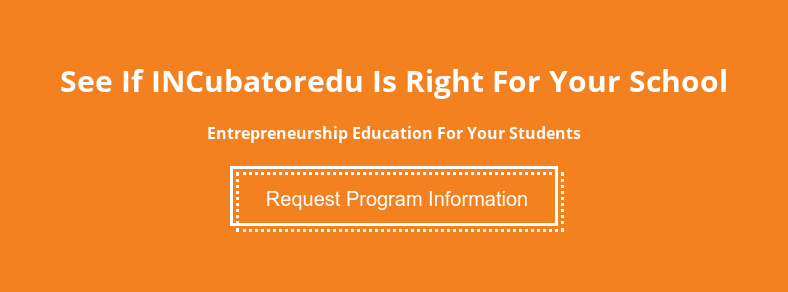 What do you think of when you think of an entrepreneur? Most associate specific attributes like risk-taking, grit, passion. But what makes an entrepreneur? We hear them say, 'being willing to learn from failure, to be open to shifts, and never give up'. These sound like traits that students could benefit from, and they are.
What do you think of when you think of an entrepreneur? Most associate specific attributes like risk-taking, grit, passion. But what makes an entrepreneur? We hear them say, 'being willing to learn from failure, to be open to shifts, and never give up'. These sound like traits that students could benefit from, and they are.
Entrepreneurship has found its way into K12 education in the past several years, and it's inspiring not only students, but teachers, and their communities. Entrepreneurship education opens eyes and possibilities—empowering those who are willing to dive in.
To learn more about modern entrepreneurship education and teaching entrepreneurship to students, we turned to three EntreTalk podcast interviews. high school entrepreneurship teachers Kelley Watson (MacArthur High School, Irving ISD, TX), Michael Archbold (Rich Township High School, IL), and Stephanie Thomas (Williamson County Schools, TN), discuss their paths to entrepreneurship education, how they’ve adapted to distance learning, and, most importantly, the student success stories they’ve encountered along the way.
Entrepreneurial Roots
Kelley Watson is an entrepreneurship educator at MacArthur High School in Irving, Texas. Growing up, she watched her parents and grandparents adapt to career challenges by adopting an entrepreneurial mindset.
She watched her grandfather develop commercial real estate and build a motel and club with his own hands. She helped her parents as they created their company while she was growing up. You might say entrepreneurship is in her blood. But figuring out her career path didn’t go as she originally planned.
“I had high hopes of living in New York, but that didn’t happen,” Kelley shared with EntreEdTalk. Instead, she stayed down south and worked as an assistant to a sales department. “I learned a lot about marketing, advertising, product placement, everything.” Then, someone recommended she become a teacher. “I said, ‘Not so.’”
Eventually, Kelley dipped her toes in as a substitute. “Fourteen years later, I am now a teacher,” she told EntreEdTalk. “I love it here, because no matter their socio-economic background or their level of experience, students are given the opportunity to realize their dreams.” With the support of the district and a robust curriculum behind her, Kelley has been able to help countless students turn their dreams into reality.
Student Success at the White House
One of Kelley’s students, Juan Ramos, just moved to Texas from El Salvador when she met him. He didn’t speak much English, but he was determined to learn so he could excel in his new environment.
In eleventh grade, Juan told Kelly he wanted to create an app — so that’s just what he and his business partner Amina Jamali did. They built an app called Better Than History, a gaming experience that teaches students historical facts and gives them the chance to change the course of history.
The app won a variety of young entrepreneurship awards, and Juan, Kelley, and Amina were invited to the White House Science Fair by President Barack Obama to present the app.
Students are natural problem solvers. When they have a clear vision, the right resources, and a strong support system, there is no limit to what they can do. The first step is igniting their passion and helping students understand their “Why.”
Helping Students Find Their Why
Entrepreneurship educator Michael Archbold spent years working odd jobs. From sales to staffing, insurance to customer service, he did it all — and eventually realized none of it was fulfilling him. “This wasn’t what I wanted to do for the next 30–40 years of my life,” he said in his EntreEdTalk interview.
“I love the inner workings of business. I love marketing, I love talking to people … and I thought, what better way to continue on in the business world than to become a high school teacher? I felt like that was the next best step.” But teaching entrepreneurship isn’t quite the same as teaching math or science. There is no “right” answer, and the curriculum is ever-changing.” Michael shared.
“But I’m really trying to get my students to understand why they’re doing all this ... I’m trying to get my students to think about their purpose. It’s not about handing students a worksheet to fill out or assigning a grade. It’s about giving them the tools they need to feel prepared for whatever the world throws their way.”
Adapting to the Distance Learning Pivot, One Step At a Time
It’s no secret that educators like Michael have made major shifts to their teaching approach over the last year. Students and teachers everywhere shifted from in-person to remote learning with virtually no warning. The lack of face-to-face interaction among teachers, students, and peers weighs heavily on everyone.
“The other day, I said, ‘I am over this. I’m done. I don’t want to do it,’” Michael told EntreEdTalk. “I give 100% credit to Uncharted Learning and the INCubatoredu squad for helping keep my mind in all this craziness.” The INCubatoredu curriculum teaches students to be successful by teaching them how to fail.
“I hope the kids walk away understanding how to think, how to collaborate, how to problem solve, how to fail and be okay with it,” Michael shares. “If they can learn those skills, it doesn’t make them a perfect human being, but it gives them a leg up when they walk out of the four walls of high school.”
Learning and Adapting
Of course, learning outside the walls of a physical high school is something today’s high school students will always remember. And it’s not just the education industry that’s been affected. INCubatoredu students are adapting to learning online and, at the same time, pivoting their business ideas to meet the current needs of the world.
At Williamson County Schools in Tennessee, entrepreneurship teacher Stephanie Thomas has witnessed her students stepping up to the challenge. A year ago, a pair of students in her class set out making their own trail mix, with the intent of selling it at the local farmers market in reusable glass jars.
It was a great idea ... until the pandemic hit and farmers' markets closed. “So, they pivoted,” Stephanie shared with EntreEdTalk. “They decided to create a nonprofit called Volunteer Teams, instead.”
The team built a website that connects high school students in Williamson County with volunteer opportunities at local nonprofits. The website’s calendar lets nonprofits put out a call for volunteers for specific events, and allows high school students looking to gain community service hours to sign up on the spot.
Don’t Be Afraid To Change
“I find that a lot of people are so stuck in the way they’ve done something for so long. Be open to change and doing it a different way,” Stephanie said. “I say all the time, I am not the smartest person in the room. I think people feel like you’re supposed to know everything when you’re the teacher, but so many times I’ve learned when the students ask me a question and I don’t know. I say, ‘Let’s figure it out together. Let’s get on Google and learn.’ It really creates a good dynamic between the students and me. The more you treat them as mature adults, the more you’ll get out of them.”
Navigating Uncharted Territories Together
Industries around the world continue to face new challenges and opportunities every day in response to the global pandemic. Educators are among many essential workers who have learned to roll with the changes while making a difference through their work, day in and day out.
Now, more than ever, passion, creativity, and problem solving are what’s needed most—and these traits can be developed in entrepreneurship education. As we emerge from the pandemic era and come together around a new 'normal', we honor teachers who are embracing change with optimism, and supporting student growth.
